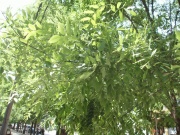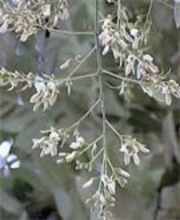Difference between revisions of "Pagoda tree"
Jump to navigation
Jump to search
m (Text replace - "== Authority ==" to "== Sources Checked for Data in Record ==") |
|||
| Line 27: | Line 27: | ||
| − | == | + | == Sources Checked for Data in Record == |
* F. Crace-Calvert, ''Dyeing and Calico Printing'', Palmer & Howe, London, 1876 Comment: p. 304 | * F. Crace-Calvert, ''Dyeing and Calico Printing'', Palmer & Howe, London, 1876 Comment: p. 304 | ||
Revision as of 13:30, 1 May 2016
Description
A medium sized tree, Styphnolobium japonicum, native to Japan, China and India. The Japanese pagoda tree is considered one of the best trees for bonsai. Also, a yellow-green dye, waifa green, is produced by dipping alum mordanted cotton in the flower extract then drying the cloth in the sun.
Synonyms and Related Terms
Japanese pagoda tree (Sophora japonica; Styphnolobium japonicum); waifa; enjo (Jap.)
Other Properties
Broad spreading tree growing to 10-20 m Bark = grayish or reddish brown with vertical furrows Leaves = alternate pinnate Flower = creamy white, hanging clusters Fruit = Green pod containing pearl-like seeds
Additional Images
Sources Checked for Data in Record
- F. Crace-Calvert, Dyeing and Calico Printing, Palmer & Howe, London, 1876 Comment: p. 304
- Wikipedia, the free encyclopedia, at http://www.wikipedia.com Comment: http://en.wikipedia.org/wiki/Pagoda_tree (Accessed Oct. 8, 2005)
- Website address 1 Comment: Virginia Tech Dendrology website at www.fw.vt.edu/dendro/dendrology/main.htm (accessed Oct. 8, 2005)




